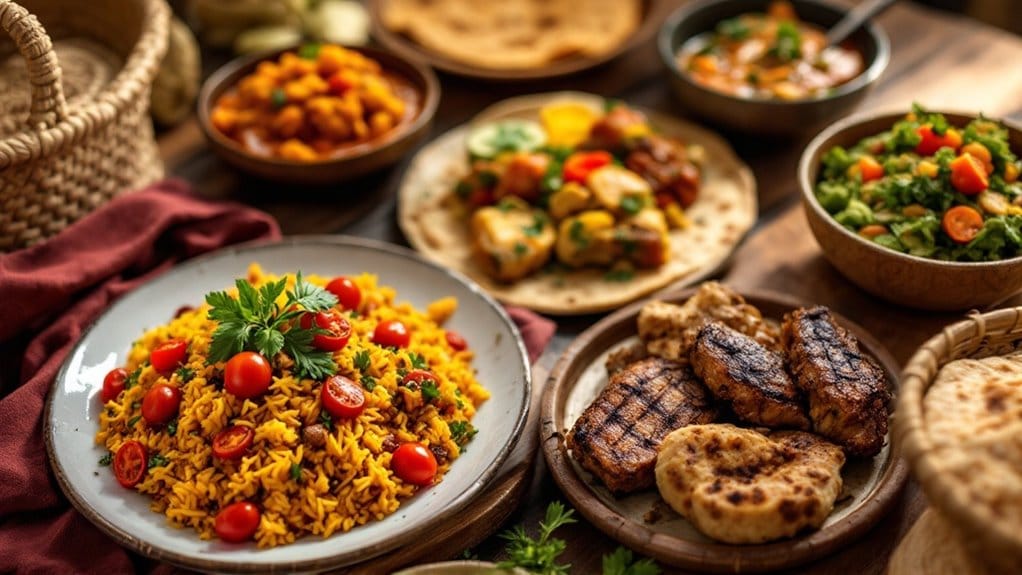You should experience iconic African dishes because they offer a vibrant blend of rich flavors and cultural significance. Each dish tells a story, connecting you to traditions and communal bonds. From the spicy goodness of Jollof Rice to the savory delight of Egusi Soup, these meals showcase local ingredients and health benefits, enhancing your well-being. Plus, sharing these foods fosters connections with friends and family, turning meals into celebrations. Engaging with Africa's culinary heritage invites you to explore its diverse and dynamic culture. Keep exploring to uncover even more fascinating aspects of this delicious journey.
Key Takeaways
- African dishes like Jollof Rice and Egusi Soup offer rich, diverse flavors that reflect the continent's culinary heritage and regional ingredients.
- Enjoying these dishes promotes health benefits through nutrient-rich ingredients and anti-inflammatory spices, supporting overall well-being.
- Experiencing iconic meals fosters cultural connections, enhancing community bonds and shared traditions during communal dining.
- Engaging with African cuisine allows for culinary innovation, blending traditional flavors with contemporary trends, creating exciting fusion dishes.
- Social media has increased global awareness of African dishes, inviting curiosity and participation in the continent's vibrant culinary culture.
Rich and Diverse Flavors
As you explore African cuisine, you'll discover a rich and diverse tapestry of flavors that reflect the continent's cultural melting pot. Each of the 54 countries contributes to this vibrant culinary landscape, inviting you to experience something truly special.
When you immerse yourself in West African dishes, like Jollof Rice or Nyama Choma, you'll encounter bold flavors and comforting textures that make every meal a celebration. The signature dishes showcase the region's culinary traditions, featuring staple ingredients such as peanuts, yams, and plantains. These elements blend beautifully, creating tantalizing meals that appeal to both the adventurous eater and those seeking comfort food.
In contrast, East African cuisine often surprises you with its incorporation of coconut milk and seafood, adding distinct richness to the overall flavor spectrum. This diversity in food not only highlights the unique taste profiles of various regions but also fosters a sense of belonging as you share these experiences with others.
Ultimately, African cuisine invites you to explore its exciting combinations, making it a wonderful choice for anyone enthusiastic to discover new and diverse culinary experiences.
Health Benefits of African Cuisine
There's no denying that African cuisine offers a wealth of health benefits that can enhance your overall well-being. By embracing traditional African dishes, you open the door to a vibrant array of ingredients that promote health. Whole grains like millet and sorghum, along with nutrient-rich sweet potatoes, provide high fiber content, aiding digestion and ensuring your body gets essential nutrients.
When you enjoy dishes like Githeri, which combines various plant-based proteins and vegetables, you're not just savoring flavors; you're also supporting your digestive health. Lean meats and fish feature prominently in African cooking, providing crucial protein without excess fat.
Plus, many spices commonly used, such as ginger and turmeric, are celebrated for their anti-inflammatory properties, further enhancing the health benefits you gain.
Incorporating a balance of proteins, vegetables, and whole grains makes traditional African dishes not only delicious but also a great foundation for a well-rounded diet. By choosing these meals, you're nurturing your body while connecting to a rich culinary heritage that values health and community.
Cultural Significance of Meals
When you gather around the table for a meal, you're not just sharing food; you're partaking in a rich tradition of communal dining that strengthens bonds.
Each dish carries a story, connecting you to your family's culinary heritage and the generations that came before you.
These meals transform ordinary moments into celebrations of togetherness, reinforcing the importance of family gatherings in African culture.
Communal Dining Traditions
Throughout various cultures in Africa, communal dining traditions play a vital role in fostering connections among families and communities. When you gather around a shared meal, you're not just enjoying food; you're participating in a rich tapestry of cultural identity. Traditional recipes, often passed down through generations, are essential in this process. They nourish both the body and the spirit, reminding you of your roots.
Celebratory dishes like Jollof rice and Injera take center stage during social gatherings, marking significant life events and reinforcing bonds with loved ones. The act of communal dining symbolizes unity, as everyone partakes from the same pot, showcasing a spirit of generosity and hospitality that's fundamental to African cultures.
These meals are more than just food—they're a celebration of culinary heritage. Festivals and events centered around traditional dishes allow you to experience this vibrant culture firsthand. By sharing these moments, you deepen your connection to the community, creating memories that last a lifetime.
Embrace the joy of communal dining, and you'll find yourself not just at the table, but also woven into the fabric of a diverse and welcoming heritage.
Culinary Heritage Preservation
Preserving culinary heritage is essential for maintaining cultural identity and fostering community connections. When you engage with African dishes, you're not just tasting food; you're experiencing a rich tapestry of stories and traditions.
These authentic flavors are a crucial part of who we are, reminding us of our roots and the bonds we share with one another.
Here are three key reasons why this preservation matters:
- Cultural Identity: Traditional recipes are passed down through generations, serving as a medium for storytelling and cultural expression.
- Community Bonds: Meals like Jollof Rice and Injera aren't just for sustenance; they symbolize celebration and togetherness, reinforcing kinship during special occasions.
- Local Ingredients: Culinary practices emphasize the use of local ingredients and cooking methods, ensuring that our heritage remains vibrant despite globalization.
Family Gatherings Importance
Meals play an essential role in bringing families together, serving as a bridge that connects generations. During family gatherings, traditional recipes like Jollof Rice and Fufu aren't just food; they're a celebration of your cultural identity. Each dish tells a story, preserving shared experiences and reinforcing kinship ties that bind you to your loved ones.
The communal dining experience creates a space where laughter, love, and memories flourish. It's not only about the meal; it's about the connections you forge around the table. These moments strengthen community bonds, reminding you that you're part of something larger than yourself.
Here's how these gatherings transform lives:
| Experience | Impact |
|---|---|
| Sharing meals | Fosters deep emotional ties |
| Passing down recipes | Preserves cultural identity |
| Celebrating occasions | Strengthens family relationships |
| Enjoying together | Creates lasting memories |
Popular African Dishes to Try
When you explore popular African dishes, you'll encounter a vibrant mix of signature flavors and ingredients that make each meal unique.
These dishes not only satisfy your taste buds but also reflect the rich cultural significance behind them.
Plus, many of these foods offer health benefits, showcasing the nutritious side of African cuisine.
Signature Flavors and Ingredients
Flavor is the heart of African cuisine, showcasing a vibrant tapestry of ingredients and cooking methods that vary across the continent. If you want to explore the signature flavors and textures of West African cuisine, here are some must-try dishes:
- Jollof Rice: This quintessential dish captivates with its rich, spicy tomato flavor, often complemented by sautéed beef and sides like jama-jama. It reflects the fusion of African and Louisiana culinary traditions.
- Egusi Soup: Made from ground melon seeds, this soup has a unique flavor and thick texture. Traditionally served with fufu, it emphasizes the use of indigenous ingredients that define West African cooking.
- Suya: Enjoy the bold, spicy kick of this skewered meat dish, marinated in a flavorful Yaji spice mix. It's a delicious showcase of the spices that make African cooking so distinctive.
Don't forget to pair these dishes with Fufu, a dough-like staple, or Injera, a sourdough flatbread, to enhance your experience.
Each bite invites you to savor the communal spirit and rich heritage that these iconic dishes represent.
Cultural Significance of Dishes
African dishes carry deep cultural significance, often serving as a bridge between generations and communities. When you gather around a pot of Jollof Rice, you're not just enjoying a meal; you're participating in a celebration that echoes through weddings and festive occasions across West Africa.
Each spoonful of Egusi Soup connects you to family gatherings, reminding you of the importance of togetherness and communal feasts. As you tear off a piece of Fufu and dip it into a savory stew, you embrace the tradition of eating by hand, reinforcing bonds with those sharing the meal.
Suya, with its spicy marinade, invites you to join lively street food scenes, where flavors and friendships intertwine at social events. Injera, the sourdough flatbread, serves as an edible plate, fostering connections during communal dining experiences in Ethiopian and Eritrean culture.
Each of these dishes is more than just food; they're cultural delicacies that embody the spirit of belonging and community. So, when you taste these iconic African dishes, you're not just satisfying your hunger—you're becoming part of a rich cultural tapestry that celebrates unity and connection.
Health Benefits of Cuisine
Exploring the health benefits of popular African dishes reveals a treasure trove of nutrition that can enhance your well-being.
By incorporating these vibrant meals into your diet, you're not just enjoying delicious flavors but also nourishing your body with fresh, natural ingredients.
Here are three key benefits of these iconic dishes:
- Nutrient-Dense Ingredients: Many African dishes, like Jollof Rice and Egusi Soup, are packed with proteins and vitamins that improve digestion and boost your immune function.
- Heart Health: Ingredients like peanuts, found in Mafe and African Peanut Soup, are rich in healthy fats and protein, supporting cardiovascular wellness.
- Anti-Inflammatory Properties: Traditional spices such as ginger and turmeric aren't just for flavor; they offer significant anti-inflammatory benefits, enhancing your overall health.
Culinary Trends and Innovations
Culinary innovation is reshaping how we experience traditional African dishes today. You'll find that the rise of fusion dishes is expanding culinary horizons, blending iconic dishes like Jollof Rice and Injera with international flavors. This exciting mix allows you to savor familiar tastes in fresh, unexpected ways.
Food influencers and celebrity chefs are showcasing these culinary delights, elevating the visibility of African cuisine in the global food market.
Health-conscious diners are particularly drawn to these innovations, as many traditional recipes emphasize fresh, natural ingredients like whole grains, legumes, and vibrant vegetables. This aligns perfectly with the modern trend of healthier eating, making African dishes not just delicious but also nutritious.
With the increasing availability of African ingredients and cooking techniques, chefs are free to reinterpret traditional recipes, crafting dishes that cater to contemporary palates.
You'll discover that these culinary innovations not only preserve the essence of beloved dishes but also invite everyone to participate in a shared experience of culture and flavor.
Embrace these trends and explore how they enhance the rich tapestry of African cuisine, making it more accessible and relatable than ever before.
Social Media's Impact on Cuisine
The rise of social media has transformed how you discover and engage with cuisine, particularly with dishes from the African continent. Platforms like Instagram and TikTok have sparked a surge in interest among food lovers, showcasing vibrant and authentic dishes such as Jollof Rice and Egusi Soup.
This newfound visibility fosters a sense of belonging and curiosity about diverse culinary traditions.
Here are three ways social media impacts African cuisine:
- Increased Visibility: Engaging content shared by food influencers highlights authentic recipes and unique cooking techniques, making them accessible to everyone.
- Cultural Connection: The global diaspora shares their culinary heritage, promoting pride in traditional dishes and encouraging culinary exploration among non-African audiences.
- Restaurant Engagement: African cuisine restaurants leverage social media to showcase their dishes, inviting food lovers to experience unique flavors in their communities.
Experiencing Authentic African Culture
Experiencing authentic African culture through its cuisine offers a rich tapestry of flavors, traditions, and stories waiting to be uncovered. When you immerse yourself in West African dishes like Jollof Rice and Fufu, you're not just savoring food; you're partaking in communal dining customs that bring people together.
Traditional recipes passed down through generations serve as a medium for storytelling, showcasing the significance of local ingredients like peanuts and greens. As you enjoy dishes like Egusi Soup and Suya, you'll notice how they reflect African identity and pride, highlighting unique flavor profiles and cooking techniques.
Each meal represents a cultural expression, reinforcing the importance of food in social gatherings and community bonds. Attending cultural events and festivals allows you to celebrate authentic African cuisine and fosters a deeper appreciation for its diversity.
Engaging with African culinary heritage invites you to explore flavors that mirror historical trade routes and cultural exchanges, enriching your understanding of this vibrant culture. By embracing these dishes, you're not just tasting; you're connecting with a legacy that transcends time and geography, creating a sense of belonging.
Frequently Asked Questions
What Is Special About African Food?
African food's special because it reflects a rich cultural heritage, showcasing diverse ingredients and regional variations.
You'll discover unique flavor profiles that come from traditional recipes passed down through generations.
The communal dining experience invites you to gather with others, sharing meals that celebrate connection.
Plus, the culinary techniques used highlight the creativity and skill of each region, making every dish a true representation of the continent's vibrant and varied culinary landscape.
Why Is African American Food Important?
African American food's important because it embodies cultural heritage, showcasing culinary diversity and rich flavor profiles.
It carries historical significance, connecting you to stories of resilience and identity expression. Sharing meals fosters community bonding, allowing you to connect with others while celebrating traditions.
Plus, these dishes often offer nutritional value, promoting well-being.
How Has African Food Influenced the World?
African food has greatly influenced the world through culinary fusion, blending global spices with traditional techniques.
You can see this impact in the modern adaptations of classic dishes that celebrate regional diversity while promoting cultural identity.
As you explore these flavors, you'll appreciate how they contribute to food sustainability, enriching your culinary experiences.
What Is the Most Famous Dish in Africa?
You might think you know Africa's culinary treasures, but wait until you discover Jollof rice. This vibrant dish, with its spicy tomato flavor, stands out among other contenders like Bobotie spice and Bunny chow.
Picture the rich Injera origins or the diverse Tagine variations. It's hard to ignore the savory allure of biltong preparation or the comforting Ugali traditions.
Jollof rice isn't just a meal; it's a celebration of culture and community.
Conclusion
By exploring iconic African dishes, you're not just tasting rich and diverse flavors; you're also connecting with the cultural significance behind each meal. The health benefits and culinary innovations make these dishes even more enticing. So, why not commence on this delicious journey and experience the vibrant stories each dish has to tell? Delving into African cuisine isn't just about food; it's about embracing a unique cultural heritage that enriches your palate and perspective.








